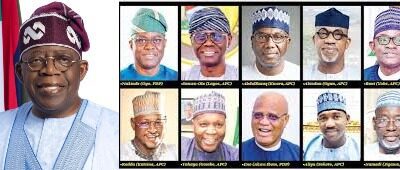Economic Issues
Taxation, not the next pot of gold -By Lekan Sote

Massachusetts is a state in America, whose punishing tax regime has earned it the derisive sobriquet, “Taxachusetts.” Now that revenue from the black gold, petroleum, is plunking, and some states, like Lagos State, boast that their internally generated revenue, from tax and rates, can meet almost their needs, without the usual handout from the Federal Accounts Allocation Committee, the Federal Government is seriously looking towards that direction.
Every tax loophole is going to be plugged, the Minister of Finance, Dr. Ngozi Okonjo-Iweala, hints, so that revenue shortfall caused by lower oil prices, will be made up through taxation. Media reports indicate that the federal and some state governments owe close to three months salaries to some categories of civil servants. The Accountant-General of the Federation, Gabriel Onyendilegu, says matter-of-factly that “the function of (salary) payment is dependent on available cash.” Well, those versed in the lore of algebra would have said payment of salaries is a function of availability of cash.
A former Chairman of the Federal Inland Revenue Service, Mrs. Ifueko Omogui-Okaaru, had turned the thinking of the Federal Government towards effective taxation, by homing in on the Company Tax, Petroleum Profits Tax, Gas Income Tax, Value Added Tax, Education Tax, and Pre-Operational Tax. And she tactically nudged the Nigerian Customs Service to ramp up import and excise duties. Alas, the Federal Government was slow on the uptake-because of free flow of oil money.
But Omogui-Okaaru had emboldened some state governments to more diligently pursue collection of income tax, other rates, and sweep in the informal sector, like the market mammies, “mama put restaurants,” artisans, etc., into the tax dragnet. Right now, the Ogun State Government is desperately calling on its residents who work in Lagos State to remit their Personal Income Tax to its treasury.
To strengthen the taxation infrastructure, the Acting Chairman, Kabir Mashi, says the FIRS will endow M.Sc Taxation Studies in universities, to train high calibre taxation personnel; research into global taxation trends, development and good practices; and mainstream taxation studies into school curriculum.
The Chief Operating Officer of Student Advocacy Initiative, Ropo Oduwole, argues that today’s kids are more literate about tax matters than their elders, through the efforts of Tax Clubs that are gradually instilling salient taxation values into young people. The initiative is to catch ’em young, from age three to 25, turn them into tax advocates, and make them taxpayers when they start earning income.
Paragraph 59 on the Exclusive Legislative List of Nigeria’s 1999 Constitution empowers the Federal Government to tax “incomes, profits and capital gains…,” and paragraphs 7-10 on the Concurrent List, also empower state and local governments to collect tax, by authorisation of the National Assembly. The seal is Section 24(f) that requires a citizen to, “declare his income honestly to the appropriate agencies and pay his tax promptly.” So, like death, tax is inevitable.
Taxation has always been the vehicle to raise funds to run governments all over the world. It just got neglected in Nigeria when the freebie of oil money came. Royalties paid by International Oil Corporations are certainly bigger, and easier to collect, than other taxes. Those old enough will remember how, up till the early 1970s, young men were hauled off the streets into cells for tax evasion. Apart from providing security, social services, and infrastructure, taxation could be used to redistribute wealth, and to encourage or discourage production or importation of certain products.
It could also be used to fight crime, as shown in the jailing of American mafia boss, Al Capone: No one could pin a crime on him, though it was an open secret that he masterminded several heists, extortions, and murders. So, they looked into his finances, and jailed him for tax evasion. That ended his career. American tax law even assesses the tax implications, and collects the tax due, for illicit drug deals – like cocaine, heroin –even as the sheriffs escort the culprit to the penitentiary.
Everyone can see that the oil royalties and the sundry taxes and rates received by the Nigerian state aren’t really used to benefit the people. The National Chairman of the All Progressives Congress, John Odigie-Oyegun, assures Nigerians that an APC Federal Government won’t steal public funds. But the arguments of Tunde Shelle, Lagos State Chairman of Peoples Democratic Party, shouldn’t be discounted. He posits that Lagos, arguably the best run state in Nigeria, hasn’t done enough, considering the huge revenue it receives from IGR, FAAC and bonds.
Shelle’s argument probably answers a query raised by political economist, Prof. Pat Utomi. He wonders if the N5.5bn and N2bn donated, respectively by the collective of power sector companies and, a director of the Ibadan Electricity Development Company, to the N21.7bn campaign fund for the reelection of the President, is in any way linked to the N213bn Electricity Stabilisation Facility granted by the Federal Government to the privatised power sector. It appears like a good question; it wasn’t a lisp. Apart from what looks like a round tripping of sort, it reminds you of the accusation that the usual practice of Nigerian public servants is to take their surfeit of government revenue before spending the remnant on the people.
Someone argues that Nigerian governments suffer cash crunch because of the political elite’s preference for policies that promote immediate gratification, over long-term projects like infrastructure, high volume industrial capacity building, and accumulation of huge financial capital.That explains why the legislature increased the 2014 Federal Budget recurrent expenditure from N2.43t to N2.45t, though it also increased capital expenditure from N1.10t to N1.110t, the largest portion of which is debt servicing. To show disdain for capital expenditure, the Executive arm will be disbursing part of the 2014 capital allocation with the 2015 budget.
The panic that the fall of oil price has caused is actually a symptom of the short-term thinking of the political elite, though there is nothing wrong with government going after tax evaders. Everything is however wrong with a state that fails to create an enabling environment for business to flourish, then turns round to ask cash-deficient companies and individuals to come pay tax. At best, such a state will only be able to deduct PAYE Tax from its employee civil servants. Company Tax will certainly be marginal, though most people may not be able to avoid paying VAT.
The preference for immediate gratification over long-term planning, and the normal lag between lifting of crude oil by the IOCs, and the settlement of their accounts payable to government, have both conspired to put government on a perpetual regime of issuing Treasury Bills to cover short-term expenditures. This will likely continue, and will rile economist Henry Boyo to no end, especially because the largest proportion of the money – royalties, sundry taxes, rates, and utility bills – that the government borrows from the banks belongs to government. A banker argues that bank Cash Reserve Requirements of 20 per cent for non-government deposits, and 75 per cent for government deposit is to reassure foreign trade partners. Well.
If government will be left to taxing its workers, and borrowing its own money, because of dwindling petro naira, and the private sector can’t pay tax, because of infrastructure deficiency, the pot of gold that Okonjo-Iweala thought she saw in a renewed tax drive, is no more than a dark tunnel at the end of a ray of silver lining. And that would indeed be a great disappointment for this hard-working, and maybe overstretched, financial czarina.




















